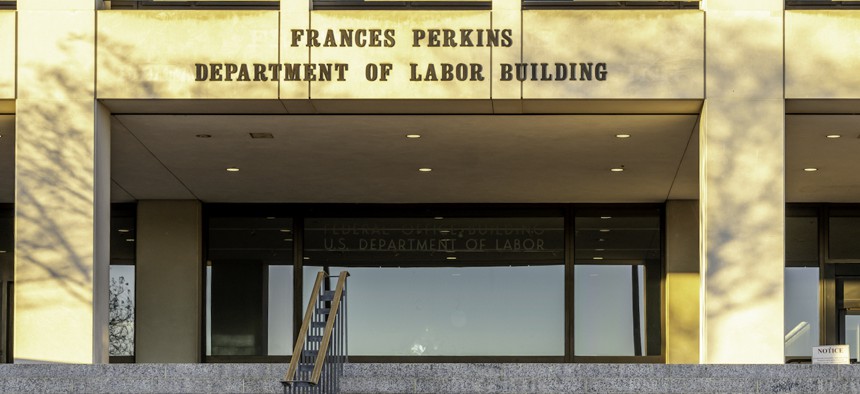
The rule will go into effect Sept. 3. JHVEPhoto/Getty Images
Labor Dept. office rolls back portions of Trump-era policy on handling discrimination claims against contractors
Regulations implemented Friday said that a 2020 rule change aimed at making investigations into allegations of discrimination more efficient in practice did the opposite.
The Labor Department’s Office of Federal Contract Compliance Programs on Friday published a final rule rolling back portions of Trump-era regulations that it said proved counterproductive to resolving claims of discrimination by federal contractors.
First proposed in March 2022, the rule change sought to excise portions of a rule implemented in December 2020, near the end of then-President Trump’s term, that instituted stricter evidentiary requirements that the OFCCP would have to meet before approaching a contractor about rectifying discriminatory incidents or policies and requiring the office to loop a contractor in earlier in the investigatory process.
In a statement announcing the new rule, published Friday in the Federal Register, the Labor Department said that while the Trump-era policy was intended to improve efficiency in resolving cases, in practice the opposite took place.
“The 2020 rule imposed inflexible evidentiary requirements early in OFCCP’s compliance evaluation process and attempted to codify complex definitions for ‘qualitative’ and ‘quantitative’ evidence and other standards,” the department wrote. “These definitions and standards hindered the agency’s ability to pursue cases with merit and diverted agency and contractor resources away from addressing discrimination.”
The 2020 changes to evidentiary rules required the office to identify which theory of discrimination—disparate treatment and/or disparate impact—when informing contractors of potential violations of anti-discrimination rules, and devised specific evidentiary thresholds in order to issue any pre-enforcement notice. OFCCP typically issues a predetermination notice and a notice of violation to a federal contractor prior to formally engaging in enforcement actions.
In Friday’s rule, the office described how the new evidentiary standards, rather than creating greater certainty for contractors and the office alike, created a legal morass where the parties would haggle over whether evidence in a given case was adequate to meet the standards.
“Rather than creating clear standards and more effective enforcement, the [2022 proposed rule] noted that the 2020 rule instead resulted in time-consuming disputes with contractors over the application of the new requirements,” the rule states. “The [proposal] also described how the 2020 rule placed certain obligations on OFCCP that went beyond, or were even in some cases inconsistent with, Title VII principles and case law.”
The office asserted that a new requirement that OFCCP demonstrate that findings of discrimination must be “practically significant” was not rooted in Title VII of the Civil Rights Act, and noted that multiple appellate courts have ruled is unnecessary to satisfy a “prima facie case of employment discrimination.” And the office stressed that Title VII’s evidentiary rules are “flexible” and “dependent on the unique facts” of an individual case.
The rule reiterates a portion of the 2020 regulations requiring the office to issue both a predetermination notice—previously an optional step—and a notice of violation to contractors under investigation, but did away with a provision that they meet the 2020 evidentiary standards prior to issuing a predetermination notice.
“Not only did this require OFCCP to meet a heightened evidentiary threshold before issuing even a preliminary notice of findings to contractors, but the same standard applied to both the predetermination notice and the notice of violation, rendering the two notices—which were originally intended to serve separate purposes—duplicative,” Friday’s rule states. “Accordingly, the [2022 filing] proposed to restore the function of the predetermination notice to convey preliminary findings of potential discrimination, providing contractors early notice when OFCCP had found potential issues and fostering more efficient exchanges of information that may focus the scope of review.”
When the rule was first proposed last year, federal contractors were wary, arguing not enough time had passed to judge whether the 2020 rule was working and feared a return to inconsistent enforcement thanks in part to poorly trained compliance officers, as cited in a 2016 Government Accountability Office report.
The Labor Department sought to assuage those concerns in its final rule, noting that the office will retain the requirement that contractors receive both a predetermination notice and notice of violation whenever the office has found evidence of discrimination, as well as a process by which the contractor may work with OFCCP to address findings prior to the issuance of either notice. The final rule also replaces the term “indicators of discrimination,” which opponents saw as imprecise, with a more concrete “preliminary findings of discrimination.”
“OFCCP notes that there are significant legal guardrails retained in this final rule that address concerns raised by commenters with regard to due process,” the regulation states. “This final rule will require the agency to issue to contractors three separate notices regarding any preliminary findings or findings the agency makes related to discrimination before the agency makes a final determination about whether to refer the matter to the Office of the Solicitor for enforcement. Each of these notices requires OFCCP to describe its findings to date and invite the contractor to respond.”
OFCCP Acting Director Michele Hodge said in a statement that the rule restores needed flexibility for her office’s compliance officers while providing contractors with greater consistency in enforcement actions.
“Today’s final rule better aligns our procedures to allow us to use our resources more strategically to remove barriers to equal employment opportunity,” she said. “The rule also enables us to identify and remedy unlawful discrimination more effectively and gives federal contractors early notice of our concerns and an opportunity to respond.”
Friday’s rule will go into effect Sept. 3.







